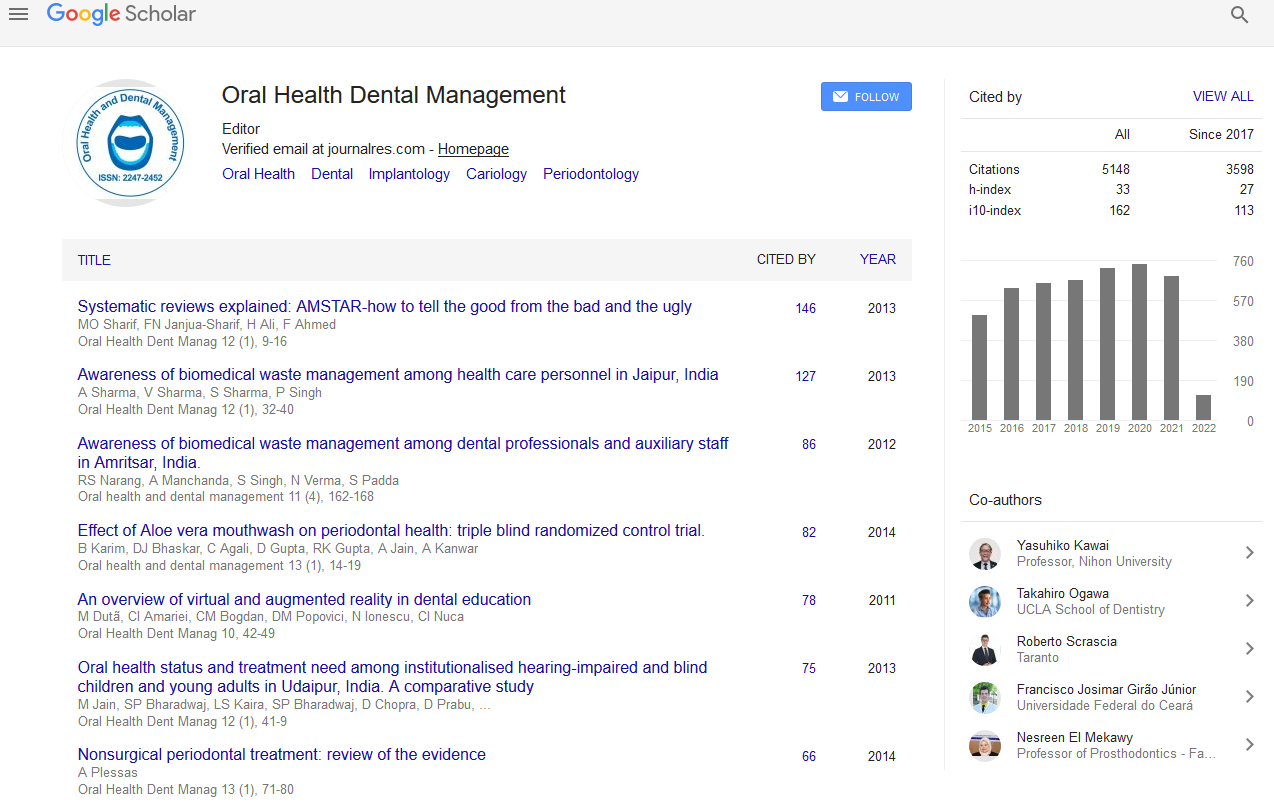Indexed In
- The Global Impact Factor (GIF)
- CiteFactor
- Electronic Journals Library
- RefSeek
- Hamdard University
- EBSCO A-Z
- Virtual Library of Biology (vifabio)
- International committee of medical journals editors (ICMJE)
- Google Scholar
Useful Links
Share This Page
Journal Flyer

Open Access Journals
- Agri and Aquaculture
- Biochemistry
- Bioinformatics & Systems Biology
- Business & Management
- Chemistry
- Clinical Sciences
- Engineering
- Food & Nutrition
- General Science
- Genetics & Molecular Biology
- Immunology & Microbiology
- Medical Sciences
- Neuroscience & Psychology
- Nursing & Health Care
- Pharmaceutical Sciences
Ramadan fasting and oral pathologies
International Conference and Exhibition on Dentistry
March 18-20, 2015 Dubai, UAE
Nicola Luigi Bragazzi
Scientific Tracks Abstracts: Oral Health Dent Manag
Abstract:
Ramadan fasting represents one of the five pillars of the Islam creed. Even though patients are exempted from observing this religious duty, they could be willing to take part into the religious ceremonies. Here, we review the extant literature focusing on the impact of Ramadan fasting on patients suffering from oral pathologies. From the collected evidences, we can claim that: 1) trans-cultural counseling of patients suffering from oral diseases is extremely important; 2) Muslim subjects could experience malodour and halitosis; the exact etiology of this phenomenon is complex, due to the accumulation of sulphur- containing compounds in the oral cavity, a decrease in salivation and changes in the oral microflora. An accurate oral hygiene when breaking the fast is recommended, for example using miswak which has anti-bacterial properties; 3) dental operations can be performed using special precautions, changing drugs and administering intramuscular or trans-dermal treatment instead of oral agents; appointments can be delayed or postponed, if necessary and possible; 4) patients with chronic systemic diseases, and especially metabolic disorders, such as diabetes, should take care of their oral cavity; 5) mouthwash and mouth-rinsing without water swallowing are allowed practices in Islam and ameliorate athletic performances, even though some patients or subjects could be reluctant to do it, perceiving these practices as a break of the fast.
Biography :
Nicola Luigi Bragazzi is currently a MD, MSc, PhD and a resident in Public Health. He got his MD (medical degree) in 2011 with a final mark of 110/110 cum laude with a thesis on Personalized Nanomedicine (?Nanomolecular aspects of medicine, at the cutting-edge of the nanobiosciences in the field of health-care?) and the joint Italo-Russian MSc (Master of Science) in nanobiotechnologies at Lomonosov Moscow State University (2012). He got his PhD in nanochemistry and nanobiotechnology at Marburg University, Germany and is currently a resident in Public Health at University of Genoa, Italy, 3rd year. He is author and/or co-author of several publications.

